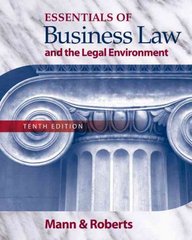Question
Consider a community inhabited by n goat-farmers, n > 1, each of whom owns goats that graze on a common field. If Farmer i, i
Consider a community inhabited by n goat-farmers, n > 1, each of whom owns goats that graze on a common field. If Farmer i, i = 1, . . . , n, sends gi goats to the field, then he/she earns
i(g1, . . . , gn) = giV (G) 10gi, where G = g1 + + gn, and V (G) = 100 G.
(a) What is the total number of goats grazing in the field in a Nash equilibrium?
(b) Find the number of goats grazing if the field is owned by a single farmer.
(c) Why is your answer in part (a) larger than your answer in part (b)?
NOW Consider the same framework: There are n goat-farmers, n > 1, each of whom owns goats that graze on a common field. If Farmer i, i = 1,...,n, sends gi goats to the field, he/she earns
i(g1, . . . , gn) = giV (G) 10gi, where V (G) = 15. (So value per goat is constant at 15.)
(d) A Nash equilibrium does not exist. Why?
(e) The phenomenon "Tragedy of the Commons" does not occur here. That is the cattle
on this common are not so puny and stunted? Why?
Step by Step Solution
There are 3 Steps involved in it
Step: 1

Get Instant Access to Expert-Tailored Solutions
See step-by-step solutions with expert insights and AI powered tools for academic success
Step: 2

Step: 3

Ace Your Homework with AI
Get the answers you need in no time with our AI-driven, step-by-step assistance
Get Started


